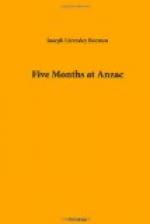Another boy, bringing a barge full of men ashore, directed them to lie down and take all the cover they could, he meanwhile steering the pinnace and standing quite unconcernedly with one foot on the boat’s rail.
AT WORK ON THE PENINSULA
Casualties began to come in pretty freely, so that our tent was soon filled. We now commenced making dug-outs in the side of the gully and placing the men in these. Meantime stores of all kinds were being accumulated on the beach—stacks of biscuits, cheese and preserved beef, all of the best. One particular kind of biscuit, known as the “forty-niners,” had forty-nine holes in it, was believed to take forty-nine years to bake, and needed forty-nine chews to a bite. But there were also beautiful hams and preserved vegetables, and with these and a tube of Oxo a very palatable soup could be prepared. A well-known firm in England puts up a tin which they term an Army Ration, consisting of meat and vegetables, nicely seasoned and very palatable. For a time this ration was eagerly looked for and appreciated, but later on, when the men began to get stale, it did not agree with them so well; it appeared to be too rich for many of us. We had plenty of jam, of a kind—one kind. Oh! how we used to revile the maker of “Damson and Apple’!” The damson coloured it, and whatever they used for apple gave it body.
One thing was good all the time, and that was the tea. The brand never wavered, and the flavour was always full. Maynard could always make a good cup of it. It has been already mentioned that water was not at first available on shore. This was soon overcome, thanks to the Navy. They convoyed water barges from somewhere, which they placed along shore; the water was then pumped into our water carts, and the men filled their water-bottles from them. The water, however, never appeared to quench our thirst. It was always better made up into tea, or taken with lime juice when we could get it.




